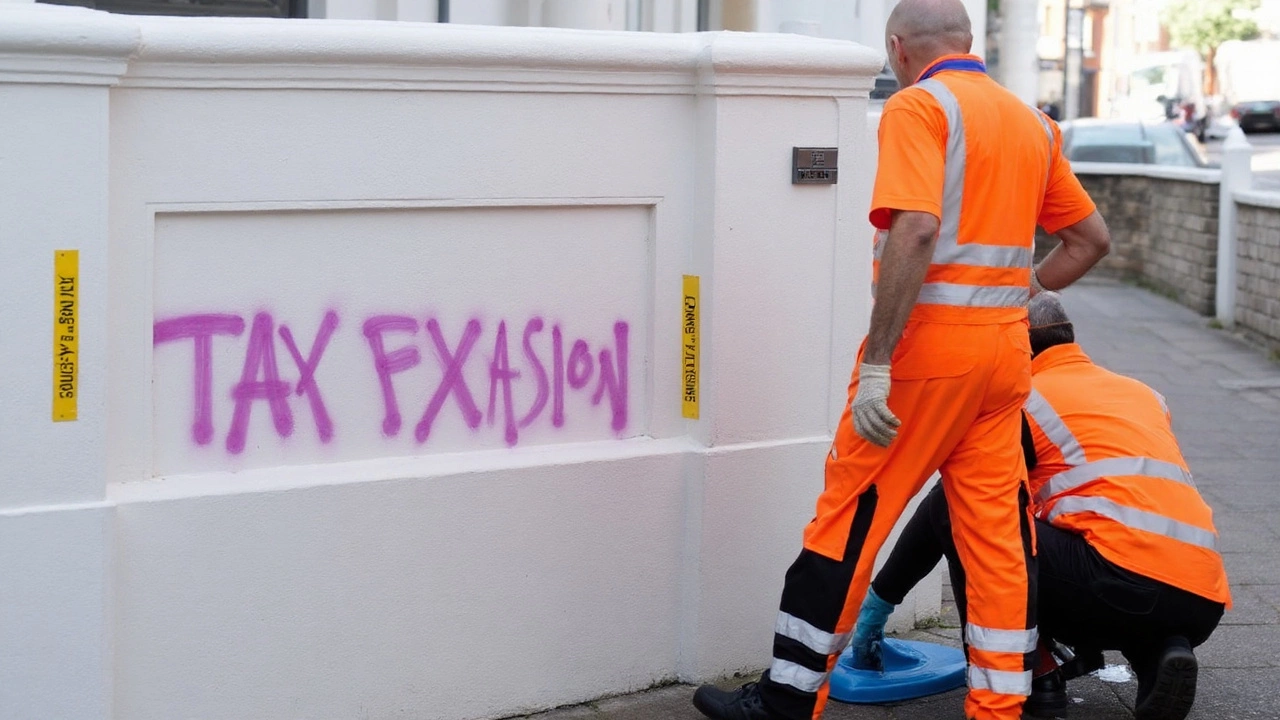Graffiti scrubbed after local pays the bill
Graffiti accusing Angela Rayner of being a “tax evader” has been wiped from a white wall outside her £800,000 seaside flat in Hove after a nearby resident stepped in to fund the clean-up. The tags, which included profanity, appeared on Thursday, along with more paint on construction chipboard across the road reading “tax evader Rayner” and “Rayner tax avoidance.”
Brighton and Hove City Council initially planned to remove the paint on Thursday afternoon. Workers then stood down after complaints from locals who said the council was moving faster than usual compared with other graffiti around the city. By Friday, the council confirmed the offensive paint had been taken off, citing security concerns and its policy to prioritise removing offensive material. Officials said the bill was covered by a resident.
Sussex Police say the markings are being treated as criminal damage. Officers are speaking with Ms Rayner about any additional security needs. That’s standard practice when graffiti targets a high-profile figure and appears outside a private home. Investigations of this kind typically look for CCTV, eyewitness accounts, and any repeat patterns in the area, though police have not set out those steps publicly in this case.
Prime Minister Keir Starmer condemned the vandalism in the strongest terms. Ms Rayner’s spokesperson called it “totally unjustifiable” and “beyond the pale,” adding that neither she nor her neighbours should be subjected to harassment or intimidation. The message was blunt: political argument is fine, targeting someone’s front door is not.
The speed of the clean-up became a flashpoint on its own. Some residents complained that non-offensive tags and murals elsewhere often sit for days or weeks, while this case got attention within hours. Councils generally work to a tiered system: anything abusive, obscene, or threatening gets priority, particularly near homes, schools, or transport hubs. Neutral tagging usually sits lower in the queue, with property owners asked to agree to removal and sometimes cover costs. In Hove, the council said “offensive” was the deciding factor, alongside safety.
Beyond the local argument, this episode showed how fast a political controversy can spill into a neighbourhood dispute. A dispute about tax, a wall, and a bill turned into a wider debate about fairness, safety, and where politics ends and private life begins.

Tax row, resignation, and what happens next
The graffiti appeared after Ms Rayner publicly acknowledged she had underpaid stamp duty when she bought the Hove flat. She has referred herself to the government’s standards adviser, who will decide whether ministerial rules were breached. Opposition parties — the Conservatives and Reform UK — intensified calls for her to step down. On Friday, Ms Rayner resigned as deputy prime minister, housing secretary, and deputy Labour leader.
Here’s the backdrop. Stamp Duty Land Tax (SDLT) is paid on property purchases in England and Northern Ireland. There’s a higher-rate surcharge on second homes. If a buyer gets it wrong, HM Revenue & Customs can pursue the underpayment; buyers can also correct mistakes voluntarily. Penalties and interest can apply, depending on the circumstances. The specifics of Ms Rayner’s liabilities are not public, and her case now sits with the standards adviser.
The standards adviser’s role is to assess potential breaches of the ministerial code — the rulebook that governs how ministers behave in public office. That includes honesty, accountability, and proper handling of personal interests. The adviser can investigate and report to the prime minister with findings and recommendations. There’s no set timetable; some inquiries wrap in weeks, others take months. Outcomes can range from no action to formal reprimands and, in serious cases, resignations. Ms Rayner’s resignation has already changed the political picture, but the process and any separate tax steps continue on their own tracks.
Calls for her to go had been building. Opponents argued the stamp duty issue undermined her standing as a senior minister and party figure. Supporters pushed back, saying the matter was being weaponised and should be dealt with through formal channels, not street-level harassment. The prime minister striking a hard line against the vandalism while the standards process runs hints at the balance No 10 is trying to strike: condemn intimidation, keep judgments on conduct inside the official process.
The Hove incident also touches a wider trend: public figures are increasingly dealing with protests and personal intimidation at their homes. Police forces across the UK have been more proactive about safeguarding measures since a series of incidents targeting politicians in recent years. The boundary between legitimate protest and criminal damage is not complicated in law — painting abuse on private property is a crime — but it can get muddied in practice when political anger spills over into private spaces.
At street level in Hove, the practical question was simpler: who pays, and how fast? Councils often juggle limited budgets, contractor schedules, and demand spikes after good weather or high-profile events. In this case, a local resident covered the cost to speed things up. That move won’t settle the fairness debate, but it did remove the taunts outside a front door that had become a magnet for attention, phones, and tension.
Politically, Ms Rayner’s departure from government and party leadership duties is a shock moment for Labour. As deputy prime minister and housing secretary, she was central to the government’s housing agenda and a key public face for the party. Losing her from both Cabinet and the party’s leadership team creates gaps that will need filling fast. It also raises questions about how the government handles conduct issues among senior figures while trying to keep its legislative programme on track.
What happens next? Three strands run in parallel. First, Sussex Police continue to treat the graffiti as criminal damage. If evidence emerges, charges could follow, but there’s no public timeline. Second, the standards adviser considers the stamp duty matter under the ministerial code, which operates independently from the criminal law and from HMRC’s tax processes. Third, any outstanding tax questions sit with HMRC, where underpayments can be settled through assessment or voluntary disclosure.
For Hove, the paint is gone, but the argument isn’t. Residents want consistency on graffiti response and costs. Politicians want a clear, calm process on conduct. And the police want to stop this kind of doorstep escalation before it becomes a pattern. This week showed how those threads knot together when national politics meets an ordinary street — and how quickly a white wall can become a battleground.
